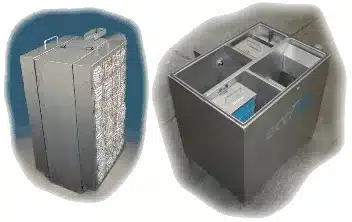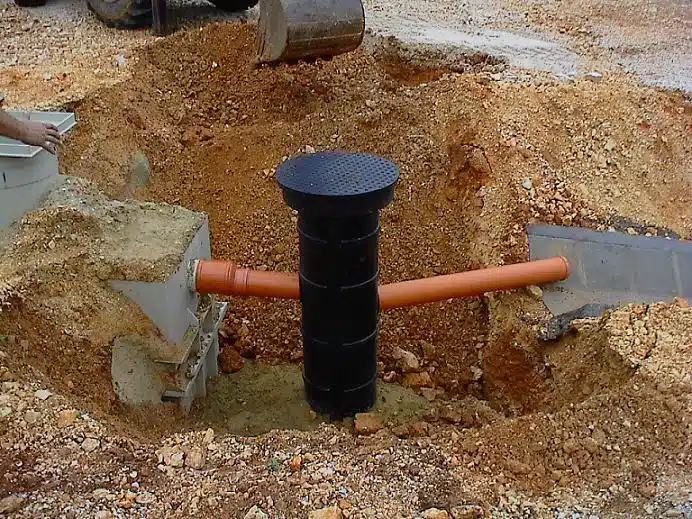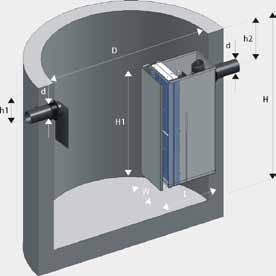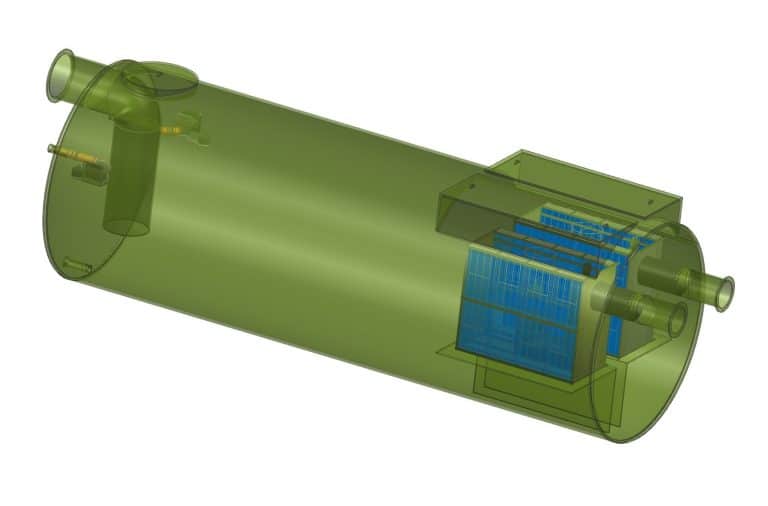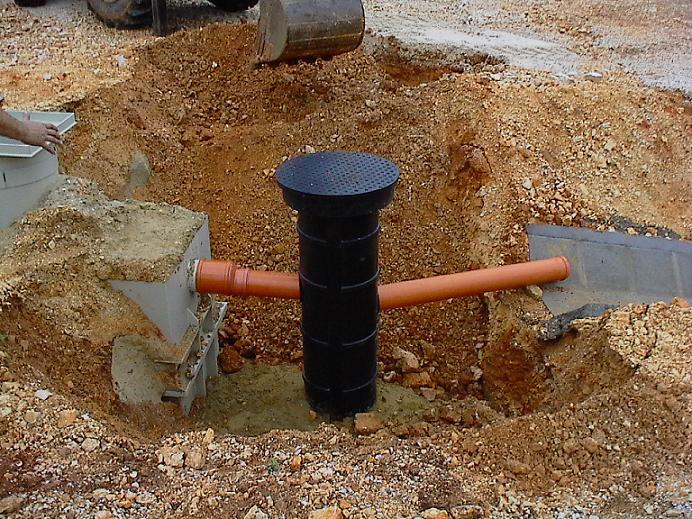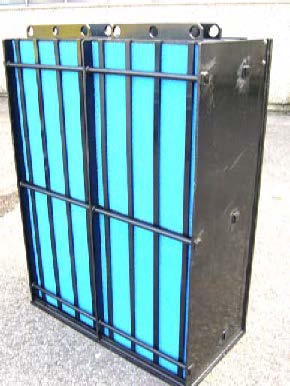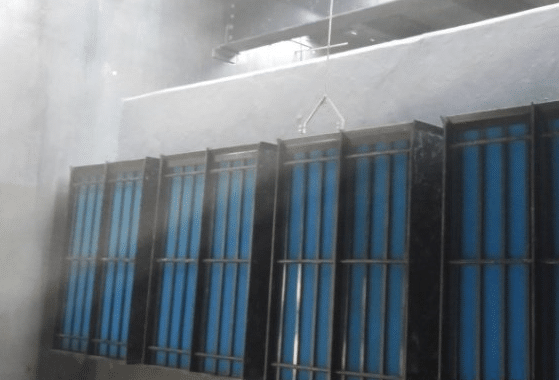New Jersey’s environment is changing fast. The state is leading in cleaning up PFAS and fighting floods. Businesses now face new challenges in handling wastewater. Below Ground Oil Water Separators (OWS) are key to meeting these new standards. But are you up to date with the latest rules?
The NJDEP has set tough PFAS standards and new flood rules. These rules protect our water and fight climate change. For industries using subsurface wastewater disposal, following these rules is crucial for the environment.
New Jersey Below Ground OWS systems are a smart choice for New Jersey’s green future. They keep oil and water apart before they’re released. This is key to keeping our water clean and following the law. We’ll look into how these systems can help your business stay green and legal.
Key Takeaways
- New Jersey leads in PFAS remediation with strict soil and water standards
- NJDEP proposes changes to flood regulations due to climate change
- Freytech Inc. Below Ground OWS are essential for environmental regulations compliance
- Proper subsurface wastewater disposal is crucial for water quality
- Below Ground OWS help facilities meet evolving environmental standards
Introduction to Below Ground Oil Water Separators in New Jersey
New Jersey’s industries have a big challenge with wastewater. Below ground oil water separators (OWS) are key in this fight. They work with septic systems NJ and sewage treatment plants NJ to keep our environment safe.
Definition and Purpose
OWS are special devices that separate oil from water. They’re a big part of our underground sewage system. They remove harmful petroleum products before water goes to treatment plants. This is crucial for keeping our water clean across the state.
Environmental Regulations
New Jersey has tough rules for water quality. OWS help businesses meet these standards by cleaning wastewater right on-site. This is especially important for industries that produce oily runoff. It helps them follow the law and protect our local ecosystems.
Benefits for Facilities
Using below ground OWS has many benefits for industrial and commercial sites. These systems lighten the load on sewage treatment plants NJ, save money on fines, and help keep a good environmental image. By managing wastewater well, businesses help keep our waterways clean and our communities healthy in New Jersey.
New Jersey Below Ground OWS: Compliance with State Regulations
New Jersey has strict rules to prevent groundwater contamination. The state has set high standards to protect its water. This includes rules for PFAS compounds and testing drinking water systems.
Below ground oil water separators are key to following these rules. They help facilities meet Ground Water Quality Standards. These standards require checking and cleaning of specific PFAS compounds in groundwater.
Licensed professionals must check for PFAS at sites. This is important for following environmental laws. It makes sure facilities prevent contamination and protect water.
By using and keeping up below ground OWS systems, businesses manage wastewater well. This helps them meet New Jersey’s tough environmental rules. It shows they care about responsible water use and taking care of the environment.
Design and Installation of Below Ground OWS Systems
Designing and installing below ground oil water separators (OWS) is key for them to work well. These systems need careful planning and expert knowledge. This ensures they meet New Jersey’s environmental rules.
Site Assessment and Geotechnical Considerations
First, a detailed site check is needed. This includes looking at the soil’s stability and makeup. Wastewater engineering consultants are crucial here. They check the soil and water levels to make sure the system fits right.
Sizing and Capacity Planning
Choosing the right size for OWS is vital for their efficiency. They can handle flow rates from 1 to 100 gallons per minute. The size depends on how much wastewater the facility has and the contaminants it faces. The right size stops overflows and makes sure oil and water separate well.
Material Selection for New Jersey’s Climate
New Jersey’s weather needs strong materials for OWS systems. Options include heavy-duty 304 stainless steel and fiberglass shells. These materials don’t rust and can handle big temperature changes. The material you pick affects how long the system lasts and how well it works in local weather.
When installing, making sure the sewage pipeline fits together right is very important. This needs to be done carefully to avoid leaks and make sure the flow is right. Adding things like internal sumps and skimmers that you can adjust can make the system work even better. This is especially true if the system has to deal with a lot of solids.
Advanced Technologies in Below Ground Oil Water Separators
Below ground oil water separators have made big strides in recent years. Enhanced coalescing technology has changed how these systems work. This new tech leads to better oil separation, making things more efficient.
Now, modern separators can separate oil from water at a rate of 5 parts per million (PPM). This is way better than the North American limits of 10 PPM. Some top systems can even get down to 0.1 PPM, tackling tiny amounts of emulsified oil.
These high-end separators work with many types of hydrocarbons. They handle motor oil, diesel, gasoline, and jet fuel well. They come with PVC coalescing media packs and stainless steel anchors. Plus, they have adjustable PVC oil skimmers with special O-rings for better performance.
These advanced technologies meet and beat hydrocarbon discharge limits. They help industrial and commercial places run safely and protect our water resources.
Maintenance and Operation of Below Ground OWS in New Jersey
Keeping below ground oil water separators (OWS) in good shape is key in New Jersey. Wastewater engineering consultants are crucial for this. They make sure these systems work well.
Regular Inspection Protocols
Checking OWS regularly is a must. Experts look for damage, oil levels, and sediment. Many have covers that lift off for easy access. Regular checks stop big repairs and keep with environmental laws.
Cleaning and Servicing Requirements
OWS systems need regular cleaning to work right. This means removing oil, sludge, and debris. Consultants suggest cleaning times based on how much the system is used and its size. Keeping it clean makes the separator last longer and follow rules.
Troubleshooting Common Issues
Even with good care, systems can have problems. Issues like clogged pre-filters, broken skimmers, and full chambers happen. Finding and fixing these fast is key. Some systems have special switches for backup help in solving problems.
By sticking to these maintenance steps, owners can keep their OWS systems working right. This protects New Jersey’s water and follows environmental laws.
Environmental Impact and Groundwater Protection
Below ground oil water separators are key to protecting New Jersey’s environment. They work hard to keep our groundwater safe from harmful substances.
Preventing Hydrocarbon Contamination
Stopping groundwater contamination is crucial for industrial sites. Below ground OWS systems catch and separate oil from water. This stops hydrocarbons from getting into soil and aquifers. They protect various sources like compressor condensate, surface skimmings, and machine tool coolant.
Compliance with NJDEP Standards
Following environmental rules is a must for New Jersey businesses. Below ground OWS help meet NJDEP standards, like the new Inland Flood Protection Rule and stormwater rules. By using these systems, companies show they care about local water.
Long-term Environmental Benefits
Putting in below ground OWS has big environmental benefits. These systems cut down on contamination risks from many sources. This keeps our water safe for future generations. By stopping pollution early, below ground OWS help fight climate change and keep New Jersey beautiful.
Conclusion
New Jersey Below Ground OWS systems are leading in wastewater management. They meet the state’s high environmental standards. These systems keep hydrocarbons out of water, protecting groundwater and the environment.
Freytech Inc. is at the forefront with its advanced Below Ground OWS technologies. These systems are tailored for different industrial and commercial needs. They help facilities meet discharge limits, making New Jersey’s waterways cleaner.
Using Below Ground OWS has long-term benefits. It helps businesses avoid fines and shows a commitment to the environment. As New Jersey focuses on water quality, these systems will keep playing a key role. They help balance industrial growth with protecting nature.
These separators are crucial in storm water systems. They process runoff to meet the US EPA’s Clean Water Act standards. With effective oily water treatment, facilities protect the environment and dodge big fines.


